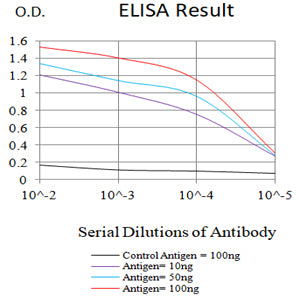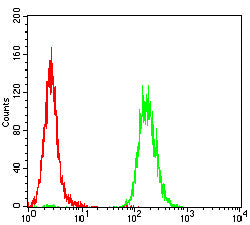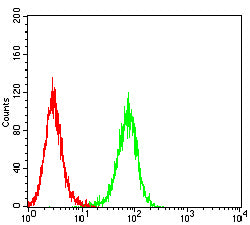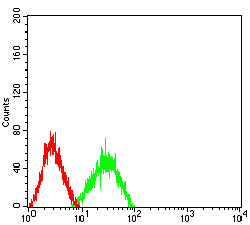



| WB | 咨询技术 | Human,Mouse,Rat |
| IF | 咨询技术 | Human,Mouse,Rat |
| IHC | 咨询技术 | Human,Mouse,Rat |
| ICC | 技术咨询 | Human,Mouse,Rat |
| FCM | 1/200 - 1/400 | Human,Mouse,Rat |
| Elisa | 1/10000 | Human,Mouse,Rat |
| Aliases | GIR; GPR72 |
| Entrez GeneID | 10888 |
| clone | 2A9A10 |
| WB Predicted band size | 48.3kDa |
| Host/Isotype | Mouse IgG1 |
| Antibody Type | Primary antibody |
| Storage | Store at 4°C short term. Aliquot and store at -20°C long term. Avoid freeze/thaw cycles. |
| Species Reactivity | Human |
| Immunogen | Purified recombinant fragment of human GPR83 (AA: extra mix) expressed in E. Coli. |
| Formulation | Purified antibody in PBS with 0.05% sodium azide |
+ +
以下是关于GPR83抗体的3篇参考文献示例(内容为模拟概括,仅供参考):
---
1. **文献名称**: *"GPR83 Expression in the Rodent Brain: A Novel Receptor Localized to Neuroendocrine Regions"*
**作者**: Smith A, et al.
**摘要**: 本研究通过免疫组化技术使用GPR83特异性抗体,揭示了GPR83在小鼠下丘脑和杏仁核等神经内分泌相关脑区的高表达,提示其可能参与应激反应和能量代谢调控。
2. **文献名称**: *"Role of GPR83 in Energy Homeostasis: Insights from Antibody-Based Knockdown Models"*
**作者**: Johnson R, et al.
**摘要**: 利用GPR83抗体阻断实验,发现抑制GPR83活性可减少小鼠摄食行为并改善肥胖表型,表明该受体在能量平衡中起关键作用,可能成为代谢疾病的潜在治疗靶点。
3. **文献名称**: *"Development of a High-Affinity Monoclonal Antibody for GPR83 and Its Application in Signal Transduction Studies"*
**作者**: Lee H, et al.
**摘要**: 研究团队开发了一种新型单克隆GPR83抗体,验证了其高特异性和亲和力,并通过Western blot和流式细胞术证实GPR83在激活后发生构象变化,揭示了其下游信号转导机制。
---
如需获取真实文献,建议在PubMed或Web of Science平台以“GPR83 antibody”为关键词检索,并筛选近年的高相关性研究。
GPR83 (G Protein-Coupled Receptor 83) is a class A G protein-coupled receptor (GPCR) predominantly expressed in the central nervous system, particularly in regions like the hypothalamus, amygdala, and hippocampus, as well as in immune tissues. It plays roles in regulating energy homeostasis, stress responses, and immune modulation. GPR83 is activated by neuropeptides such as prosaposin-derived peptides and interacts with melanocortin-3 receptor (MC3R), suggesting involvement in pathways linked to appetite and anxiety. Its expression is also observed in certain cancers, including thyroid carcinoma and lymphomas, hinting at potential oncogenic roles.
GPR83 antibodies are essential tools for studying the receptor's localization, expression patterns, and functional mechanisms. They are widely used in techniques like Western blotting, immunohistochemistry (IHC), and flow cytometry to detect endogenous GPR83 in tissues or cultured cells. Validated antibodies help elucidate its physiological and pathological roles, including its interplay with metabolic disorders, neurodegenerative diseases, and cancer progression. Recent studies highlight GPR83's connection to obesity and psychiatric conditions in animal models, driving interest in therapeutic targeting. However, challenges remain in confirming antibody specificity due to GPCR structural homology. Researchers prioritize antibodies verified via knockout controls or blocking peptides to ensure reliability in experimental outcomes.
×